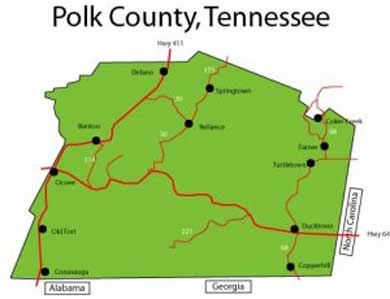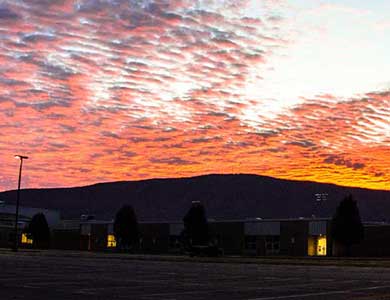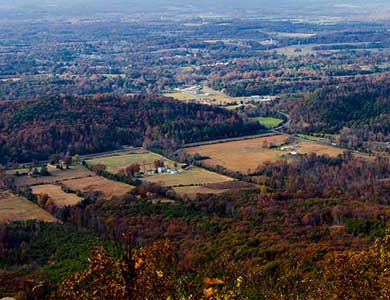Polk County Government
Polk County Tennessee Government Information
Polk County is located on the southeastern corner of Tennessee and is bordered by North Carolina and Georgia. The county was established in 1839 and named in honor of Governor and President James K. Polk and the county seat is Benton. One of the prominent industries in the history of the county has been copper mining that was first discovered at Ducktown in 1843. As a result of the copper mining, vegetation was killed for miles near the sites and left the landscape open to erosion.
In addition to copper mining, the county has three hydroelectric plants on the Ocoee River and one on the Hiwassee River that are operated by the Tennessee Valley Authority. Polk County has eight Century Farms and the oldest is the Boyd Farm that was established in 1838. For more information regarding Polk County, please go to the Tennessee Encyclopedia of History & Culture website.
Historic Polk County
Soon after the Great Removal of the Cherokees to the West, Polk County was formed by an act of the Tennessee legislature the 2nd of November 1839 from land taken from Bradley and McMinn. Polk County is located in the extreme Southeastern corner of Tennessee, with an area of 439 square miles. It is bounded on the east by North Carolina, on the south by Georgia, by Monroe and McMinn Counties on the north, and Bradley on the west. It was named to honor James K. Polk, newly elected Governor of Tennessee, and the county seat was named Bentonville, later changed to Benton, in honor of a popular and influential Senator from Missouri, Thomas Hart Benton.
Most histories say the county has three rivers that flow through our boundaries, but there are actually four, the Ocoee, Hiwassee, Conasauga, and the Jacks River, which dips in and out on the Georgia border as it merges with the Conasauga. The Ocoee was the site of the whitewater events for the 1996 US Summer Olympics, which brought much well-deserved attention to the county and to the beautiful Ocoee River. The Hiwassee is a bit milder, and is a favorite venue for fishermen, and for locals and visitors to leisurely float in rafts or tubes and enjoy the gorgeous scenery along the way. The Conasauga has some of the best places in the area to look for endangered species of fish, and has a diversity of other aquatic life to be enjoyed at the snorkeling hole there. And it is the only stream in the state that does not flow into the Mississippi, but takes a route through the Tombigbee Waterway to the Gulf of Mexico at Mobile, Alabama. Before modern transportation, it was an important route for shipping goods on flatboats to that area.
Added to those four rivers are numerous streams and lakes, including those of the Tennessee Valley Authority, which, along with the towering Chilhowee, Big Frog and Little Frog Mountains makes for some of the best floating, boating, hiking, biking, picnicking and trail walking that can be found anywhere.
Polk County is divided geographically by the Ocoee River gorge and the Chilhowee Mountain into two sections, normally referred to as East and West Polk or 'above the mountains' being the Copperhill Ducktown area, and 'below the mountains' being the Benton and surrounding communities. Visitors to the county will want to explore both sections, with the copper mining industry history highlighted at the Ducktown Basin Museum located on the site of the old Burra Burra mine.
One of the oldest historic buildings in West Polk is the old blockhouse, Fort Marr, which is a 200 year old piece of history dating back to 1814 or so. Soldiers carrying supplies to the troops during the Creek Wars often needed an overnight refuge while traveling on the old Federal Road which traverses the county. It can be seen at the Ranger Station at Gee Creek just off Highway 411 North.
Cherokee Peacemaker and Beloved Woman, Nancy Ward, is buried on a hill overlooking the Ocoee River just south of the town of Benton, and stands as a reminder of our Native American heritage and the land which was the 'happy hunting ground' of the Cherokees.
Agriculture has been the main industry in Polk County from its founding, and while not currently as large as in early days, is still important. Dairy and poultry farming, soybean production and other agricultural endeavors are still carried on in the county.
Steeped in the past, invested in the future, Polk County is not only an exciting place to visit, but is equally a most enjoyable place to live and raise families in a healthy and safe environment.













